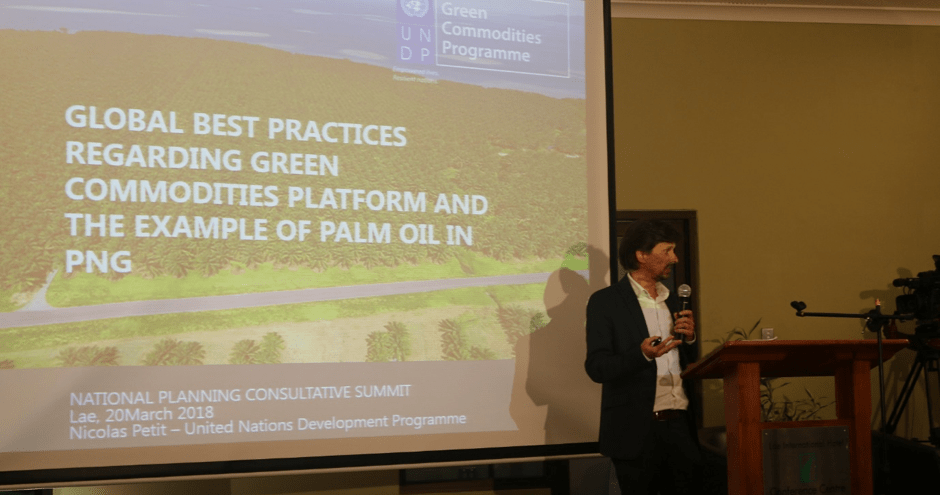
A New Step To Strengthen Sustainable Palm Oil In PNG
Port Moresby, 11 May 2018 – Change is on the horizon for the palm oil sector in Papua New Guinea(PNG) as significant steps are being taken to improve the industry.
A recent analysis of the impacts of the palm oil sector shows that the unregulated rapid expansion of palm oil is a significant threat to primary forest areas which threatens the livelihoods and culture of Papua New Guineans in forest areas and the biodiversity of the country and the planet. This is also a potential threat to national revenue. With the push from palm oil markets for more environmentally friendly and livelihood friendly products, current practices can adversely affect PNG’s access to international premium palm oil markets.

Photo: REDD+ Stakeholders at a sector retreat analysing key gaps and challenges to be mapped out in the Investment Plan. (Photo Credit: Forest Carbon Partnership Facility)
Improving the palm oil sector will need a collaborative approach and steps are already underway to formalize a platform where experts in the field convene to discuss issues of environmental impacts, rural poverty, economic benefits for landowning communities and national economic development.
With the support of key government counterparts, the statement of intent will be submitted for the National Executive Council (NEC) endorsement. The statement emphasizes the critical role of forests to the culture, livelihoods and environment of Papua New Guineans as well as their importance in global efforts to address climate change.
Stephen Mombi, Deputy Secretaryfor theDepartment of Agricultureand Livestock (DAL) Agriculture Developmentsaid: “Sustainable Palm Oil Platforms are examples of best practices for sustainable palm oil operations in other parts of the world.
“It’s been implemented globally and PNG as country can learn from that as part of the global commodity worldand importantly adapting the best practices to PNG context”, said Mr. Mombi.
“There is no policy governing the implementation of palm oil projects and programsin PNG.We need a policy, not to stop further development of palm oil but to do it sustainably taking into mind climate change and emission reduction”, he said.
The statement of intent will also serve as a national commitment to establish a Multi-stakeholder Palm Oil Platform. The establishment of the Multi-stakeholder Palm Oil Platform is a key step in adhering to international best practices and it positions PNG as a leading producer of sustainable palm oil.
Sam Moko, PNG Palm Oil National Platform Coordinator said: “It is a challenging task to establish the palm oil platform in PNG but is has been done elsewhere with other commodities and with the support of UNDP’s Green Commodity Programme we are determined to see this initiative move from conceptual to reality.
“We need the support of the industry, regulators and critics to make this happen. Most importantly the multi-stakeholder palm oil platform should be Government-led and driven by participants,” Mr. Moko said. The changes in the palm oil landscape will signal good news for the country in its drive towards reaching the global goals in reducing poverty, taking climate action and protecting and sustaining life on land.